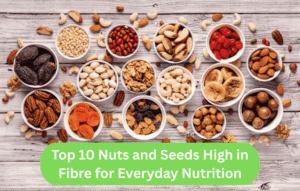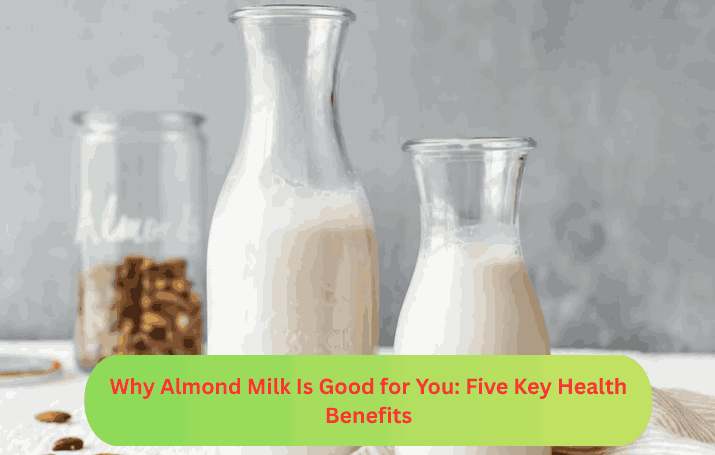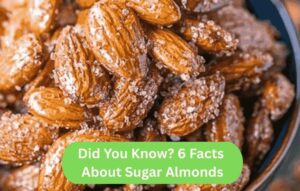
Why Almond Milk Is Good for You: Five Key Health Benefits

Introduction
Almond Milk has become one of the most popular plant-based milk substitutes in the last few years, and for good reason. Almond milk is naturally dairy-free and full of minerals. To make it, you mix almonds with water and then drain the combination. Almond milk might be a good choice for your daily diet if you can’t handle lactose, are vegan, or just want a healthier milk option.
Almond milk is more than just a trendy health drink; it also has a number of practical benefits for your body. We’ll talk about five big health benefits of almond milk in this post. We’ll also answer some common queries and explain why it can be the best choice for you.
1. Good for your heart
One of the best things about almond milk is that it is good for your heart. It has no cholesterol or saturated fat, so it’s a terrific choice for anyone who wants to keep their heart healthy or improve it.
Almond milk is often supplemented with minerals that are beneficial for the heart, like vitamin E and sometimes even omega-3 fatty acids. Vitamin E is an antioxidant that helps protect arteries from damage. Omega-3s are believed to lessen inflammation and the risk of heart disease. Almond milk’s low sodium and high potassium content also assist in keeping blood pressure at a healthy level.
2. Helps control your body weight
If you’re watching your weight, almond milk can be a smart swap for cow’s milk. Unsweetened almond milk contains only 30 to 50 calories per cup—significantly lower than whole milk, which has about 150 calories per cup.
What makes almond milk even better for weight-conscious individuals is that it’s low in sugar and carbohydrates when unsweetened. It also contains healthy fats, which help keep you feeling full and satisfied for longer periods, reducing the likelihood of overeating.
3. An excellent source of vitamin E and antioxidants
Almond milk has a lot of vitamin E in it naturally. Vitamin E is an important antioxidant that keeps your cells safe from damage and environmental stress. Up to half of the vitamin E you need each day can be found in one cup of almond milk.
This vitamin is critical for skin health since it helps keep skin looking young and healthy. It also helps your immune system and might lower your chances of cognitive loss as you become older.
4. Helps keep bones healthy (when supplemented)
Almonds aren’t a good source of calcium on their own, but most commercial almond milk brands add calcium and vitamin D to their products to make them more nutritious. These two minerals are critical for keeping bones strong and avoiding diseases like osteoporosis.
Calcium helps bones grow and get stronger, while vitamin D helps the body absorb it better. If you select almond milk, make sure you get a fortified one to help keep your bones healthy.
5. Lactose-Free and Gut-Friendly
Many people have trouble with lactose intolerance, which can make them feel bloated, gassy, and crampy in the stomach after eating dairy. Almond milk doesn’t have any lactose in it, so it’s a mild and pleasant choice for people who are sensitive to dairy.
It also doesn’t have casein or whey, which are proteins present in dairy that some individuals have trouble digesting. So, if you have a sensitive stomach, almond milk may help you digest better and have fewer digestive problems.
Conclusion
More than just a dairy-free alternative, almond milk is a healthy drink that is good for you in many ways. It’s low in calories, doesn’t contain lactose, and is good for your heart and bones, so it fits perfectly with many diets and ways of life.
Whether you’re trying to manage your weight, improve your heart health, or simply reduce your dairy intake, almond milk offers a tasty and versatile option. Just be sure to choose unsweetened and fortified versions for maximum benefits. With its mild taste and a wide range of uses, almond milk is an easy addition to any healthy lifestyle.
Frequently Asked Questions (FAQs)
Q1: Is Almond Milk safe for children?
Yes, almond milk is generally safe for children above one year of age, especially if they are lactose intolerant. However, it should not replace breast milk, formula, or cow’s milk in children under one unless recommended by a paediatrician. Always opt for unsweetened and fortified versions.
Q2: Can I use almond milk in cooking?
Absolutely. Almond milk can be used in most recipes as a substitute for dairy milk. It works well in smoothies, cereal, baking, sauces, and even coffee or tea. Just note that the unsweetened versions are better for savoury dishes.
Q3: Does almond milk contain protein?
Compared to cow’s milk or soy milk, almond milk is relatively low in protein. One cup of almond milk contains about 1 gram of protein, while cow’s milk has 8 grams. If protein is a concern, be sure to supplement with other protein-rich foods.
Q4: Can people with nut allergies drink almond milk?
No, almond milk is made from almonds and should not be consumed by individuals with nut allergies. For such individuals, oat milk, rice milk, or soy milk might be safer alternatives.
Q5: How long does almond milk last after opening?
Once opened, almond milk typically lasts 7–10 days in the refrigerator. Always check the label for specific instructions and smell or taste before use to ensure it’s still fresh.



